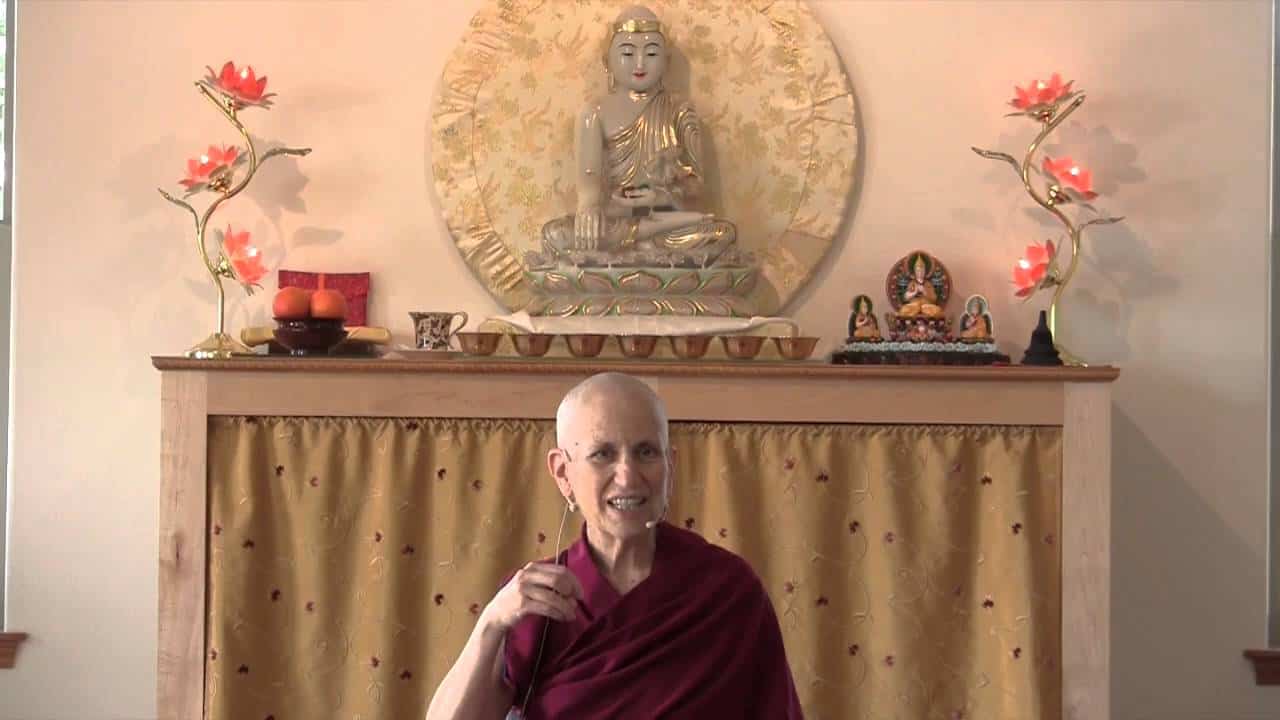Bodhicitta, the best gift
Bodhicitta, the best gift
Part of a series of teachings on a set of verses from the text Wisdom of the Kadam Masters.
- How all the happiness in the world comes from bodhicitta
- Generating the altruistic intention daily
- Coming back to bodhicitta throughout the day
Wisdom of the Kadam Masters: Bodhicitta, the best gift (download)
We’re going to move onto the next line. It says,
The best excellence is to have great altruism.
What more can you say than that? When you think that all the happiness in the world comes from the altruistic intention, you know, how we traced it back. Remember that the hearers and solitary realizers come from the buddhas, the buddhas from the bodhisattvas, the bodhisattvas come from the three causes, principal one here is the altruistic intention, bodhicitta. And so when you think that all of our virtue we created because somebody taught us. Beginning when we were little kids our parents taught us, our teachers taught us. All that kind of positive mentoring that we got all throughout our lives comes from their having gotten it, and so on and so on, and it eventually traces back to the buddhas and to the altruistic intention.
Thinking, too, going forward, what’s the best thing that we can give to sentient being? It’s developing bodhicitta. In Dignāga’s praise of why the Buddha is a reliable guide, the Buddha is a reliable guide because he has the intention to benefit sentient beings, he’s the teacher, the Sugata, the protector. The first one, it starts out with bodhicitta, the intention to be of benefit to sentient beings.
Dignāga was talking about Shakyamuni Buddha, but he’s also telling us what we need to do, is you start with bodhicitta, and then when you have very strong bodhicitta then of course you’re going to look for a way to liberate yourself and others from samsara, so you search for the teachings on emptiness, which become what actually liberates the mind, and that’s what you teach others. By that you become the Sugata, an enlightened one, someone who has gone to bliss. Then that enables you to become the protector of sentient beings. And how does the Buddha protect us? And how will we protect others when we become buddhas? Principal way is by teaching the Dharma. And so it all comes from that altruistic intention, that initial motivation.
That’s why every morning when we wake up, first thing: “As much as possible I’m not going to harm anybody. As much as possible I’m going to benefit others. And I’m going to generate bodhicitta and act from it as much as I can throughout the day.”
We’re not bodhisattvas yet, but we’re bodhisattva-wanna-bes. As wanna-bes we train ourselves. That training is very helpful. Then as much throughout the day as we can recall that motivation, it really will affect all of our actions.
In the evening we check up, we see how we did. We confess where we messed up, we rejoice in what we did well. We dedicate the merit, and we go on. That makes a very full practice.
If you look, throughout your day, whenever you have difficulties, if you stop and just come back to bodhicitta, to refuge and bodhicitta, the first two things we do in the morning and the last two things at night, and the first two at the beginning of any practice, if we come back to those at the beginning then we kind of really center our mind and settle our mind, because we’re coming back to what is most important in our lives.
Of course as we talked about before when you’re really taking refuge deeply it includes the realization of emptiness and it includes bodhicitta because it’s leading you to become the Three Jewels. And when you really generate bodhicitta deeply it leads you to refuge, again they cross-fertilize because it is again leading you to generate wisdom and to become the Three Jewels.
It’s nice to read the first chapter of Shantideva, because the first chapter is all about the benefits of bodhicitta. This is what advertisers do, they teach us the benefit of something. “You’ll now have 50 thousand dollars in credit card debt. That’s the benefit from buying this new car.” They don’t tell you that part, they tell you how cool you’re going to look. But the whole idea of telling people the benefits of something, then it interests us in doing it.
The thing is, with generating bodhicitta, we don’t go in credit card debt. It brings all the happiness in the world, and it’s free. And nobody can take it away from us no matter where we go, no matter what situation we encounter, to the extent that we’ve cultivated bodhicitta in our minds, then we’re going to be happy wherever we are. To the extent that we cultivate self-centeredness in our minds we’re going to be unhappy no matter where we are.
Venerable Thubten Chodron
Venerable Chodron emphasizes the practical application of Buddha’s teachings in our daily lives and is especially skilled at explaining them in ways easily understood and practiced by Westerners. She is well known for her warm, humorous, and lucid teachings. She was ordained as a Buddhist nun in 1977 by Kyabje Ling Rinpoche in Dharamsala, India, and in 1986 she received bhikshuni (full) ordination in Taiwan. Read her full bio.


